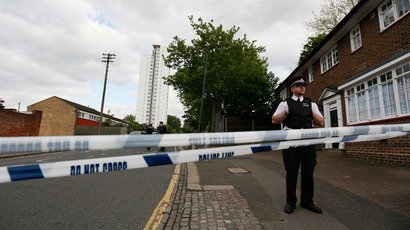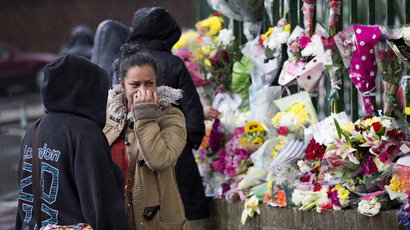UK divided: Islam used as scapegoat in extremist attacks?
Social rifts have been widening in the UK after the Woolwich murder and the discovery of an Oxford sex-grooming ring. In the midst of growing anti-Muslim protests, it has been suggested religion is merely a scapegoat in an already-divided society.
Social tensions have been on the rise on the streets of Britain following the murder of 25-year-old British soldier Drummer Lee Rigby in East London by two alleged Muslim extremists. The suspected killers claimed to be acting in vengeance for Muslims killed abroad by British troops in a video of the brutal attack.
The killing triggered violent protests from right-wing group the English Defense League (EDL) who slam the government for not doing enough against Muslim extremism. There has also been a flurry of attacks on Mosques in London and the rest of Britain in the wake of the incident.
Prior to this, the case of an Oxford-based sex-grooming ring that was active for eight years gripped the British public. Seven men of Asian origin were charged with rape, trafficking and orchestrating child prostitution among girls as young as 11.
Speculation has been rife as to the causes of these latest incidents, with some laying the blame at the feet of Britain’s growing Muslim population. However, others suggest the attacks have nothing to do with religion and originate from extremist groups that have slipped under the UK government’s radar.
Assed Baig, a UK-based freelance journalist, told RT that the latest incidents had absolutely nothing to do with Islam. He described the motives of race and religion as “red herrings.”
Speaking about the Oxford sex ring, he said the perpetrators were merely “predatory men targeting vulnerable girls who happened to be white, if those girls were Asian or black these men would have carried out the same actions.”
“The crimes that they committed are not Islamic, they are not crimes of radicalization,” stressed Baig.
Moreover, the Muslim Council of Britain has decried both the murder of Lee Rigby and the Oxford grooming ring as “appalling acts,” but has signaled that the fault should not be laid at the feet of the British Muslim Community.
Mohammed Shafiq, chief executive of the Ramadhan Foundation told RT that “if you are involved in terrorism or extremism you do not represent Islam, you do not act in our name , you are bringing shame on our community and you must be confronted.”
Referencing the attack on Lee Rigby, the MCB said that it was more concerning how the killers “slipped through the net of the security services while within their radar.”
The MCB also reminded the government that it was its responsibility to protect its citizens from right-wing extremists and urged for leadership to combat “the challenge of civic apathy.”
While Mustafa Field, the director of the Mosques and Imams National Advisory Board signaled that the perpetrators of these crimes were small pockets of radicals not affiliated with the Muslim Community.
"There's very little evidence to indicate that mosques have been involved in radicalizing individuals," he said to the Guardian. "But the mosques are left to de-radicalize them."
He went on to say that the phenomenon of “self-radicalization” is becoming more prevalent in the UK and the government needs to pay more attention to extremist individuals.
Sean Thomas, a writer and journalist based in London told RT that politicians and prosecutors alike are afraid of addressing the issue for fear of being branded as “racist.”
“It can ruin careers,” said Thomas to RT correspondent Polly Boyko.
“The fact that it took a Muslim prosecutor to cut through and say ‘Look there is a problem here,’ shows that white prosecutors, white social workers, white legal officers and white politicians were very wary of approaching the issue because they are all terrified of being seen as racist,” said Thomas.
He drew attention to the fact that the case was brought up by far right-wing politician, Nick Griffin, back in 2004. The subsequent BBC documentary that was filmed on the subject led to the political establishment trying to put a gag on the politician rather than investigate the crimes.
“They ignored everything he said and instead tried to silence his point of view and so the crimes went on for a number of years,” said Thomas.















